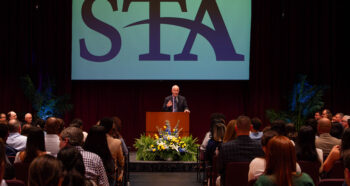In today’s rapidly changing world, it is more important than ever to foster a love of learning in our students. The Cambridge curriculum is a holistic approach to education that is designed to do just that.
In our school, we see how the Cambridge curriculum encourages curiosity, rewards exploration, and underscores the practical relevance of classroom teachings.
Our students are not just learning facts; they are developing the skills and mindsets they need to be successful in the 21st century. They are learning to think critically, solve problems creatively, and communicate effectively. They are also learning to be lifelong learners, always seeking new knowledge and experiences.
As the principal of Harvest International School, I’ve had the privilege of implementing various innovative methods to nurture and enhance love for learning among our students. Here are a few examples of these approaches:
1. Project-based learning (PBL)
Project-Based Learning (PBL) is a powerful teaching method that engages students in authentic, real-world problem-solving. For example, students might work on a project to address food insecurity in their local community. This approach sharpens critical thinking and problem-solving skills, instills a sense of social responsibility, and fosters a love for learning that extends beyond the classroom.
2. Experiential learning
We believe that experiential learning is the best way for students to learn. In our history classes, students don’t just read about ancient civilisations; they recreate historical artifacts, try ancient recipes, or participate in historical reenactments. Through these immersive experiences, they develop a deep appreciation for history and a keener understanding of its significance.
3. Technology integration
Technology is a powerful tool for learning, and at Harvest International School, we harness its power to the fullest. We integrate technology into the learning process through virtual labs, online research tools, and collaborative digital platforms.
For example, in our science classes, students use advanced simulation software to conduct experiments that would be too dangerous or expensive to conduct in the real world. This allows them to explore complex concepts in a safe, controlled environment. This not only makes learning more engaging, but it also prepares students for a future where technology is an integral part of nearly every field.
4. Mentorship programmes
Our mentorship programmes foster a culture of support and guidance. Older students serve as mentors to their younger peers, offering intellectual guidance, leadership development, and friendship.
For example, a Cambridge A level student might mentor a middle schooler by helping them with their homework, providing them with advice on college applications, or simply being a listening ear. Through mentorship, students learn from their peers and build supportive and meaningful relationships, strengthening their love for learning and sense of belonging in the school community.
5. Community engagement
We firmly uphold the notion that community engagement constitutes a vital component of a comprehensive education. We actively instill in our students the importance of becoming active participants in their community, be it through volunteering, service projects, or cultural immersion.
Consider, for instance, a scenario where a collective of students takes the initiative to coordinate a neighborhood cleanup effort aimed at addressing a pertinent local environmental concern. Through this engagement, they gain a firsthand understanding of how their acquired knowledge directly influences and benefits their community, thereby nurturing a profound sense of civic duty while emphasising the transformative power of knowledge in driving constructive change.
6. Creative arts integration
The arts are not just an add-on at our school, they are integrated into the curriculum. This integration of the arts helps students learn in a more creative and engaging way. For example, in a science class, students might use music and visual arts to illustrate scientific concepts. This not only makes the concepts more interesting, but it helps students make connections between different subjects. Through creative arts integration, students see that learning is an active and imaginative process.
7. Individualised learning paths
Harvest International School embraces individualised learning paths, which tailors the learning experience to each student’s strengths, interests, and pace of learning. This approach ensures that each student is not just a passive participant but an active architect of their education. For example, in a mathematics class, students can choose from different learning modules based on their proficiency and interests. This approach boosts confidence and fuels the love for learning by allowing students to explore topics that resonate with them.
8. Integrated outdoor education
We believe that the most powerful learning experiences happen outdoors. Our integrated outdoor education approach immerses students in nature, helping them forge a deeper connection with the world around them and cultivate a sense of responsibility towards its preservation. For example, in a biology class, students might go on an expedition to a farmhouse to explore ecosystems firsthand. This immersive strategy inspires learning with tangible experiences and fosters a deep commitment to safeguarding the natural world.
In a world that is constantly changing, the ability to learn is more important than ever before and to prepare students for the future by giving them the skills and mindsets they need to succeed.
From our experience, the Cambridge curriculum is a beacon of hope in the educational landscape.
Read other blogs from this series
Want to become a Cambridge school in India? Register your interest here





